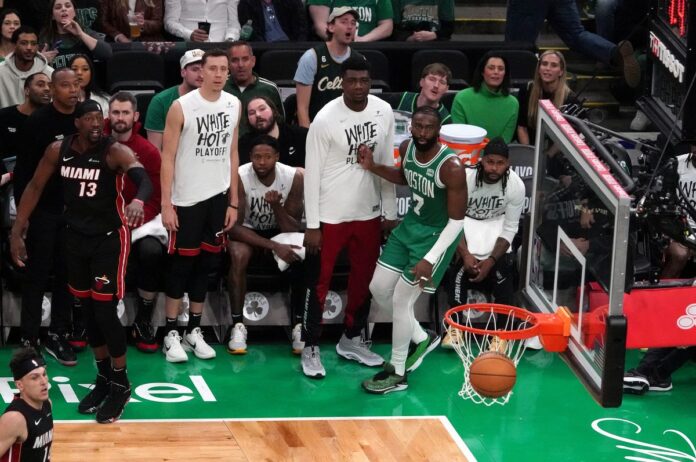Game 2 was a three-point onslaught. The Miami Heat took the data from Game 1, changed their game plan, and came out firing on Wednesday night. The Boston Celtics’ defense failed to adjust, and they suffered death by Mazzulla ball.
But while all eyes will be on their failure to protect the three-point line, Miami’s own defensive adjustments made a difficult night even harder for the Celtics.
“Obviously, their physicality,” Kristaps Porzingis said at practice on Thursday. “They tried to get up into us. Make every catch [and] every action difficult. But we also got a little bit, I think—because you value the possession so much, we got a little bit stagnant. We just need to play the same way we’ve been playing and not fall into their game too much.”
Mismatch hunting has been a core part of Boston’s offensive game plan all season. Yet the Heat welcomed it in Game 2.
The Celtics enjoyed a three-point barrage of their own in Game 1, so Erik Spoelstra made it a point to slow them down. Their attempts went from 49 to 32.
:no_upscale()/cdn.vox-cdn.com/uploads/chorus_asset/file/25418259/2149555982.jpg)
Photo by Barry Chin/The Boston Globe via Getty Images
Rather than allowing Boston to rain down daggers from beyond the arc, the Heat chased them away from the three-point line and welcomed them into the mid-range. They let the Celtics get to favorable mismatches against guys like Tyler Herro and Jaime Jaquez Jr.
From there, however, the Heat got physical, and the Celtics stalled out.
“Anytime a team is switching and [playing with] more physicality, you have to fight to exploit those with more purpose and with more physicality,” Joe Mazzulla said. “And sometimes, it takes a second or a third layer. And so, it’s just recognizing those second and third layers earlier so that we can get to them earlier in the shot clock.”
As soon as the Celtics caught the ball in the middle of the floor, the Heat sent bodies. Whether it was Bam Adebayo, Nikola Jovic, or Caleb Martin, someone was always ready to stunt and recover.
The Celtics’ response to the uptick in physicality could have been more ball movement. It could have been to fight through it and finish hard. It could have been to set better screens and catch the ball closer to the basket.
But they didn’t react quickly enough. And as Miami sent more and more pressure and the shot clock slowly ticked down, there was nothing left to do but throw up a contest mid-range look at the buzzer.
“Yeah, I mean, disrupt the rhythm,” Mazzulla said on what the Heat did. “Have us start our actions later in the shot clock. I think that’s the test of switching, pressing, aggressive defenses. You got to fight for your space earlier. You got to get into your actions quicker because it may take a second or third one to break down the defense.”
Porzingis saw the bulk of Miami’s suffocating defensive changes.
Going to Porzingis in the post has been Boston’s go-to release valve all season. They get him in a crossmatch, dump the ball to him at the free-throw line, and let him go to work. In Game 2, he didn’t have it.
:no_upscale()/cdn.vox-cdn.com/uploads/chorus_asset/file/25418263/2149550530.jpg)
Photo by Barry Chin/The Boston Globe via Getty Images
The seven-foot-two big man shot just 1/9 on the evening, including 0/4 when guarded by Herro—the mismatch Boston went to relentlessly during their regular-season contests against Miami.
“I think, obviously, fighting to— Anytime [you have] a post entry, you want to get it closer to the basket, so I think it’s all coincided,” Mazzulla said. “I think switching, there’s a reason why people do it. Because it slows you down. It makes the two-on-ones a lot longer to see, and you have to fight for those.
“And so, every layer of that has to be better. The initial screen has to be better. The seal has to be better. Catching the pass closer to the scoring area has to be better. The pass has to be better. So, just those things, they test your discipline to be better at all of those little things.”
Of the Celtics’ 12 turnovers, eight were a result of Porzingis not sealing off his man well enough, failing to body his matchup in the post, or an errant pass (made by Porzingis to trying to force the ball to Porzingis).
Boston’s offense got thrown completely off-kilter in Game 2. They didn’t push to maintain the style they wanted to play. They simply accepted the shots Miami gave them and lived with the results.
Heading into Game 3 with the same lack of offensive fight would be a recipe for disaster for Boston. They’re going to make changes. But they’re keeping them close to the vest.
“Just cleaner looks at everything,” Porzingis said. “Not being as—again, how much do I want to say? I looked at the things I can do better, but overall, there’s no reason for us to overreact.”















